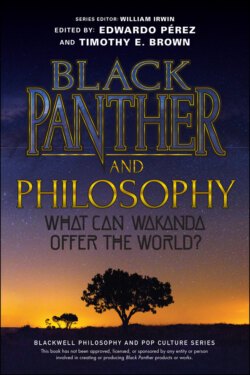Читать книгу Black Panther and Philosophy - Группа авторов - Страница 15
“Just Because Something Works …”
ОглавлениеThose who are loyal to Wakanda have to oppose Killmonger with force, but what truly brings order and peace back to Wakanda is a reassertion of the traditions and customs that have shaped Wakandan society for millennia. Having stolen a single Heart-Shaped Herb from the garden before Killmonger had it burned, Nakiya flees with Shuri and Ramonda to the Jabari Tribe in the mountains. In her desperation, she intends to give the Herb to M’Baku so that he can have the strength to overthrow the new king. What she doesn’t know is that M’Baku recovered T’Challa’s comatose body after Killmonger threw him over the waterfall.
A man less devoted to the traditions of his country might accept the Herb and take advantage of the chaos in Wakanda in order to advance his own power, but instead, M’Baku allows the women to use the Herb to revive their comatose king. So, the man who seemed backward in his traditionalism at the beginning of the film turns out to be the key not only to the restoration of peace in Wakanda, but also to saving the world from Killmonger’s murderous revolution.
Moreover, when T’Challa recovers from the coma and returns to the Vibranium Mound to oppose Killmonger, he legitimizes his actions by asserting that the ritual combat isn’t over: “I never yielded, and as you can see, I am not dead!” Killmonger and the Border Tribe reject this reasoning, of course, but when the Dora Milaje and others see that Killmonger doesn’t yet have a rightful claim to the throne, they join T’Challa in stopping him from sending Wakandan weapons across the border and beginning a war on the rest of the world.
Burke might have predicted all of this. The division sewn by Killmonger’s effort to single-handedly reshape Wakandan society; the civil war; the willingness of some to shed the blood of their fellow citizens; the restoration of peace through a reassertion of tradition – each of these things is evidence of the danger of revolution that Burke warned against and the value that he saw in tradition.
None of this means that Wakanda has to remain “stuck in the past,” however. Far from it. In fact, T’Challa does begin to reform his country after he defeats Killmonger and resumes his place as king. Having seen that Wakanda could use its resources to help the rest of the world – “the world we wish to join,” as T’Chaka says in Captain America: Civil War – he begins establishing outreach centers in other countries. It isn’t the radical course reversal that revolutionaries like Killmonger and W’Kabi wanted, of course, but the incrementalist approach allows Wakanda to grow without subjecting itself to the dangerous turmoil that rapid change causes. It represents the kind of organic development that Burke thought was healthy for nations, and allows the reclusive nation to reform and open up to the world without losing its true identity.
Wakanda forever!
